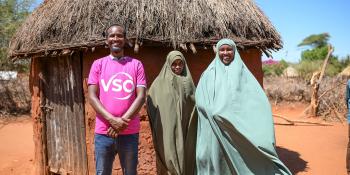This article first appeared in Third Sector.
It’s vital to move beyond artificial divisions between the ‘formal’ and ‘informal’ sectors to a new spirit of active citizenship
The global surge in volunteering that has accompanied the Covid-19 pandemic has come as no surprise to those of us who work with community activists every day. The instinct to support one’s neighbours – whether by delivering food parcels, making a friendly phone call or collecting medicines – is the bedrock on which the voluntary sector is founded.
And yet with this heart-warming explosion of largely informal community action comes a question for traditional voluntary organisations. What role do more established charities play? Much has rightly been made of the renewed spirit of kindness and social cohesion and, as Rhodri Davies of the Charities Aid Foundation wrote recently, there’s an opportunity for the sector to harness these forces in the long term.
In contemplating this opportunity, charity leaders will be keenly aware of the risk that loose, informal networks shun the involvement of bigger organisations, fearful of the bureaucracy they might bring. As they look around, it might appear to the public that centrally organised efforts for volunteers to support the NHS have faltered while local groups have flourished.
And yet, the voluntary sector should equally be in no doubt that on fundamentals – such as safeguarding, signposting and referral systems, data protection, and monitoring and evaluation – we have vital, specialist expertise and knowledge to offer. These are not optional extras. Good intentions are not enough. The risk of mistakes in these areas, and the harm they can do, is very real.
How do we straddle these apparently competing instincts? How can the “informal” and “formal” sectors work together and not, as some might fear, become rivals? Our experience at VSO is instructive. While we’re best known for the work of our international volunteers, what we do is mainly reliant on many thousands of community-level volunteers working in their countries of birth and the neighbourhoods in which they live.
Our “volunteering for development” approach is founded on a partnership between informal and formal networks. Local communities understand best what they need and the context in which it must be delivered. Our success is based on pairing this insight with specialist, professional skills. Last year we helped to develop global standards that set out how to do this effectively, which are very relevant in the UK context.
To take one example, in Nepal we support a network of young women to help teenage girls stay in school through a project, funded by the Department for International Development, called Sisters for Sisters. On one level, this is simple community activism akin to a mutual-aid group: the mentors and mentees are neighbours and friends. But we’re there to provide support for difficult conversations with parents, back them up with training on safeguarding, or provide – as in the current pandemic – clear public health advice for them to distribute.
Elsewhere, we know that the experience of responsible and effective volunteering that thousands of young British people have enjoyed in recent years through ICS is being put to good use back at home during the pandemic. The impulse to volunteer, to help out in one’s community, is the first step. But to do it well requires the knowledge, skills and support that we, as established charities, are there to provide.
As the UK battles through and recovers from a crisis of the type we are more used to watching from afar, these lessons from overseas are worth bearing in mind. We should allow no artificial divide between the formal and informal sectors. Working together, we can harness a new spirit of active citizenship that’s effective, safe and led by communities.
Read more

A ripple of change: how VSO volunteers are transforming communities
Every act of volunteering begins with a choice — a decision to act out of a desire to make a difference. Across the world, VSO volunteers are proving that one spark of action can ignite something much bigger.

The two volunteers empowering girls and young women in Mozambique
Nelma and Carmirene and are two volunteers working on VSO's EAGLE project in Mozambique. For Nelma and Carmirene, education is not just about school, it is about meeting people where they are and using the right tools to challenging harmful norms. Here are their stories.
Opening doors to safety, education, and a brighter future
For girls in Karamoja, the poorest region in Uganda, being forced into early motherhood is all too common. This Christmas, you can open the doors to Safety, Education, and a Brighter Future.
